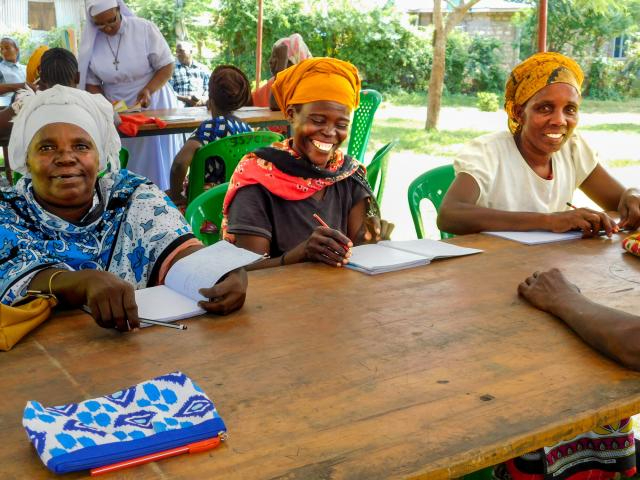If you take a look around Kikambala, a part of our Mombasa site in Kenya, you might be surprised by the number of vibrant elders you see. More of Kikambala’s villagers are in their golden years when compared to other nearby places.

These men and women did not have many educational opportunities in their youth, and few can read or write in English or Kiswahili. In turn, they couldn’t pass literacy on to their children. In areas where school dropout rates are high, the middle generation did not make many strides past their parents.
But when it came to be their grandchildren’s time, the Kikambala elders knew they had to stopper the cascade of generational illiteracy for good.
In response, the Mombasa sponsor site staff created a two-year intensive course for learners of all ages. The curriculum covers math, science, social studies, ethics and religion, agriculture and environment, English and Kiswahili, and life skills.
“We have two qualified adult instructors working to help the learners achieve their goals,” describes Sr. Janefrances, Mombasa site director, as well as four social workers as supports.
The first cohort is made up of 35 learners, 25 of whom have sponsored children. Each teacher takes a batch of 17 at a time, operating in shifts to accommodate the learners’ livelihoods and household responsibilities.
“The learners are very happy and are actively participating in their various classes,” she reports happily. They are already getting comfortable with practical math skills, reading short sentences, and responding to English greetings.
Many learners are gaining the skills to access jobs that they could not do before. The Mombasa site also hopes that more informed elders will lead to an overall improvement of Kikambala’s living standards.
“We have already some positive impacts from the community,” Sr. Janefrances says, because the class is attracting learners from outside the sponsorship program. An expanding circle of people are taking the time to learn, and to value education.
“We are hoping to train more and more parents by the end of the program,” she says, “who will be able to transform their lives, families and the society at large.”
“Much gratitude from the site, families, and community for the kind gesture to our beneficiaries for making this programme a reality.”



